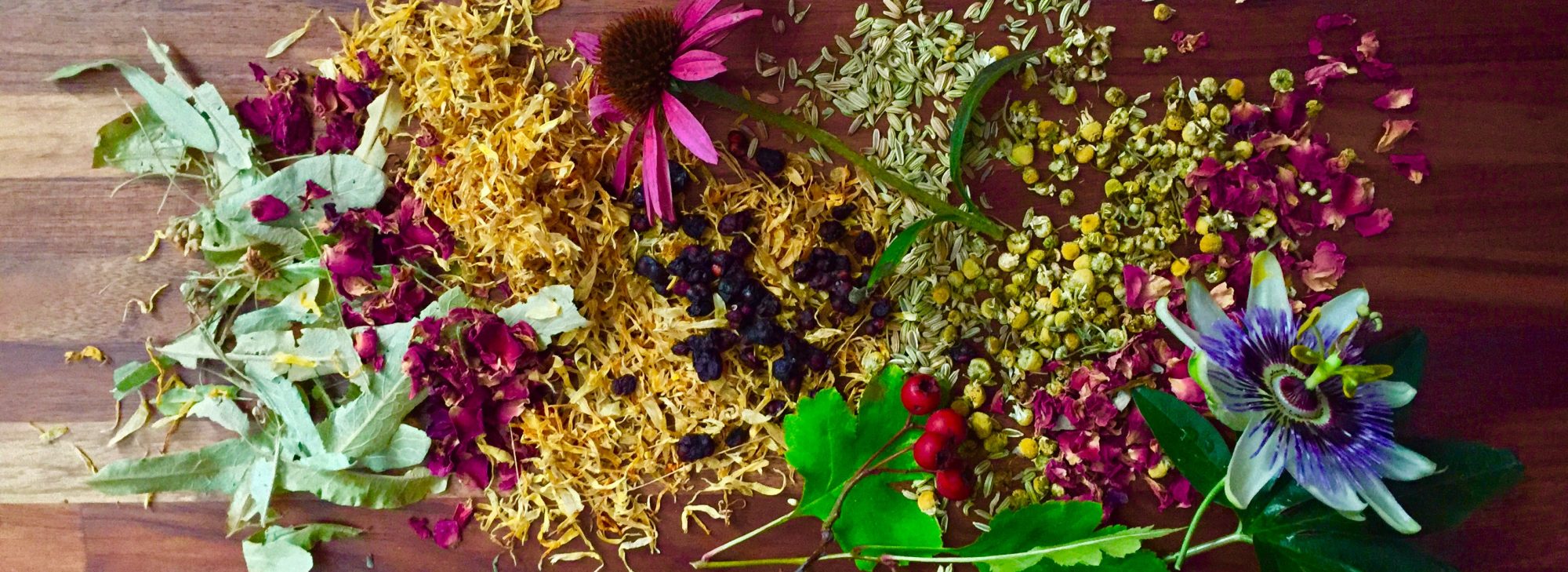Herbal Medicine (sometimes known as phytotherapy) is medicine made from plants. More well-known plants used by medical herbalists are stinging nettle, dandelion and chamomile. You may well have drunk peppermint tea after dinner, rubbed a dock leaf on a nettle sting or put arnica cream or witch hazel on a bruise – these are all simple forms of herbal medicine. Herbal medicine has been used traditionally for thousands of years to treat many different ailments, and there is increasing scientific research in this area to support this.
Depending on the plant, medical herbalists may use the root, leaves, flowers, berries, seeds or bark – it depends where the active constituents (the “ingredient” or chemical responsible for that plant’s medicinal actions) we are wanting to use are situated. One plant species may have many, many different constituents and consequently many, many different actions, which explains why two people may be prescribed the same herb for completely different reasons. Similarly, different herbs may have the same medicinal action, so any one of them could be chosen by the herbalist – but because one herb has a number of different actions, herbalists would look at all of these when choosing to see which one would suit the patient best.
Unlike orthodox medicine (the type you are prescribed by your doctor), we don’t use one herb for one ailment. Let's take eczema as an example (see here for conditions often seen by medical herbalists). So we don’t, for example, see your eczema and send you away with the herbal equivalent of steroid cream. We spend a long time talking to you about your eczema, when it started, what was going on in your life when it started, what makes it better, what makes it worse, what’s going on in your life at the moment…Is it worse at the moment because you are stressed? Is your diet as good as it should be? What’s going on with other parts of your body – your joints, your hormones, your sleep quality? How are your bowels?
Yes, herbalists are obsessed with your bowels! It’s because they give us a good snapshot of what’s going on inside your body – if your body's getting rid of waste efficiently or whether it is being allowed to build up and cause skin problems, joint problems, hormonal problems…we will ask you questions every time we see you about your bowels and to us, they are just another body part – although I appreciate you may not feel quite so comfortable about discussing them!
When we come to make up a prescription for you, we will look at all this information gathered and use it to decide what actions are needed from your herbal medicine. You may be prescribed internal medicine for your eczema or other condition as well as the cream you were probably expecting. The cream would bring quick relief of your symptoms – maybe stop the itching and the dryness of the skin. But the internal medicine (tinctures or teas) addresses other relevant issues, in a more long term way. It may contain herbs to help with stress relief, if that’s an issue with you. It could also contain another herb to help with allergies, if that’s what’s causing your eczema. If your monthly cycle affects it, there may be a herb to help balance your hormones. And if it seems your body could do with a little help with clearing waste products, it’s more than likely there will be herbs to help your liver and kidneys. This means that your medicine will tend to consist of five or six herbs, all of them specific to you, and different from what the next eczema patient will be prescribed.
Medical herbalists always take into account the most up to date scientific research when working with you, in the same way that your GP or hospital consultant does. We also know our limitations and ethical and legal obligations, and will not hesitate to refer you to other healthcare professionals such as your GP, osteopath or podiatrist if we feel that's necessary.

